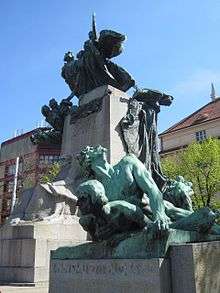Czech nationalism

Czech nationalism is the nationalism that asserts that Czechs are a nation and promotes the cultural unity of Czechs. Czech nationalism in modern sense first arose in the 19th century as Czech National Revival. In 1848 firstly transferred into the politics of Austrian Empire in Old Czech Party led by František Palacký. Czech national politicians such as Karel Kramář in home and Tomáš Garrigue Masaryk abroad, endorsed liberation during World War I as a means to free Czech lands from Austro-Hungarian rule.[1]
After 1918 and creation of Czechoslovakia, absolute majority of national politicians and society adopted Czechoslovakism as their state idea for unified country with the Slovaks.[2]
In 1990–1992 during transformation of Czechoslovakia into liberal market economy, due to disputes on shape of Czechoslovak federation, Slovak national aspirations strengthened and one of the reasons for final dissolution of Czechoslovakia in 1992 were with the Slovak nationalism also Czech economic nationalism, for not to fund not so developed Slovak economy. Czech Republic became independent on 1 January 1993.[3]
See also
Notes
- ↑ Motyl, Alexander J. (2001). Encyclopedia of Nationalism, Volume II. Academic Press. ISBN 0-12-227230-7. Retrieved 19 June 2017.
- ↑ Zdeněk L. Suda (2001). "The Curious Side of Modern Czech Nationalism" (PDF). University of Pittsburgh. Retrieved 19 June 2017.
- ↑ Skalnik Leff, Carol. The Czech and Slovak Republics. Nation versus state. Westview Press. ISBN 0-8133-2922-1.